Book Reviews by Genre: Historical
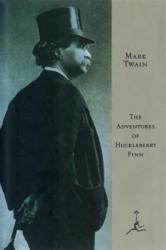
I really enjoyed reading Huckleberry Finn. I think that Mark Twain portrayed everything very well. The only part I did not like is how often Twain used the N-word for Slave. Overall great book!
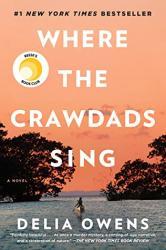
I just loved this novel. I loved how it painted the marsh with words and conjured a believable main character that you want to root for. The story line was very interesting and kept me engaged. It's not a hard read and chapters are relatively bite sized, but don't let that fool you. This book packs a punch. 5 stars!
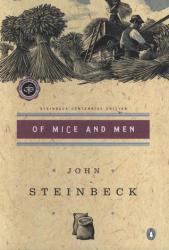
I read this book my Freshman year of high school for English class. I know that Steinbeck is a very famous author, but I just didn’t really care for this book. I thought the story, which is about two men looking for work during the Great Depression is rather boring. I cry while reading sad parts in books all the time, but for some reason the sad ending in Mice and Men just wasn’t as sad as people made it out to be. Overall, I wouldn’t recommend this book, I didn’t like the plot or Steinbeck’s writing style.
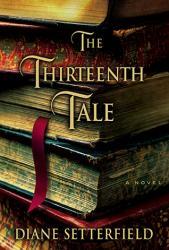
The Thirteenth Tale is a story of a woman telling a mysterious story about her childhood and her origins.It starts off with Margeret Lea, the main character, helping her father in his bookstore, and receiving a letter from a famous writer. I enjoy rereading this book because of how much mystery and confusion there is surrounding the core story, a book about twins. This is high on my list for recommendations because of how ensnaring it is to read.
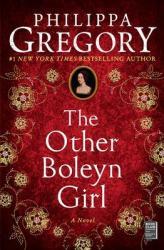
The Other Boleyn Girl is a wonderful book that was also made into a movie. The book, though historical fiction, does follow the actual events, within reason.
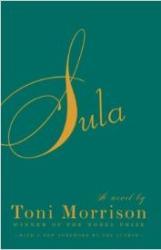
Sula, by Toni Morrison, was published in 1973. The book focuses on a black neighborhood and a friendship that develops between proper and traditionally raised Nelly and free spirited Sula. The two become very close; going on adventures and making huge mistakes throughout their adolescence, until they eventually grow apart. The novel, written by a Nobel Prize winner, is a star example of enriching African-American literature. Beautifully written, shocking, and yet also endearing, it takes readers on an insightful trip to Medallion, Ohio - one full of excitement and symbolism for modern themes.
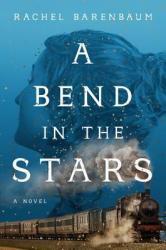
A Bend in the Stars is a fiction story about a Jewish family surviving the 1914 Holocaust. It rotates around Miri, a female surgeon in a world of Men. When the Holocaust starts, her whole life is turned upside down as the rush to America begins. I love this book for the honesty of elements like the interaction between Vanya and Kir, the two intelligent scientists, and the relationship between Sasha and Miri. I recommend this book to anyone who's looking for an interesting read.
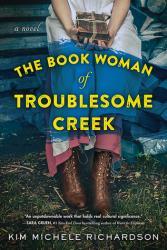
The Book Woman of Troublesome Creek was a powerful story set in the mountains and hollers of rural eastern Kentucky in the 1930s. Cussy Mary is a strong woman who has dedicated her life to providing books and other reading materials to the isolated impoverished hill folk. Cussy Mary, also called Bluet, is the last of her kind, a Blue woman with blue skin. When the ending came around, I thought I might be disappointed, but it was handled deftly and with a light hand. Very good book!
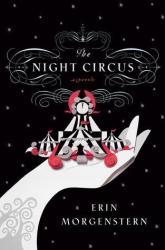
The Night Circus, by Erin Morgenstern, is a beautiful, exquisitely written, spellbinding novel of magic, love, and a special circus only open at night.
Celia and Marco are two young magicians, students of respective magical instructors, one of whom is Celia's father. These magicians, fierce rivals for decades, propose a challenge-- an ambiguous feat where the two magicians compete against each other in an expansive setting. At the same time, a theatrical producer, Chandresh Christophe Lefevre, creates his newest masterpiece-- The Night Circus, an expansive theatrical production, where the theatrics are not confined to the stage. Celia and Marco become involved in this circus through the will of their instructors. Celia becomes the illusionist, disguising her magic powers as stage illusions. Marco becomes an assistant to Chandresh, running the circus from the inside, and helping with the coordinated particulars instead of traveling with the circus like Celia.
The competition within the circus begins, Celia and Marco creating new tents in an attempt to outdo each other until one is declared a victor. And slowly, as they begin to realize that the other is their opponent, Celia and Marco fall in love, which sets off a chain of devastating events for the circus and all of the people in it.
Erin Morgenstern is a fantastic writer. Her sumptuous prose is gorgeous, and her level of detail in describing the circus makes it feel as if she had actually visited this place herself instead of creating it in her head. Even the smallest atmospherical details of the circus are mentioned, and such a rich and vivid setting envelopes the reader into the book. The story within the gorgeous setting, that of Celia and Marco, is exquisite. The book takes pace over a vast expanse of years, allowing them to grow and change and mature within their characters as the challenge progresses and they begin to fall in love with each other. Watching Celia and Marco grow throughout the novel from children to finally finding each other was a very satisfying process in the story.
The story does jump, from the main story of Celia and Marco to the story of Bailey, a young boy on a farm in Concord, Massachusetts, who visits the circus and becomes enamored with it, until the time of both stories intersect and Bailey's life crosses with Celia and Marco's.
I cannot say enough good things about The Night Circus. The story, the setting, the writing, and the characters are all wonderful. This book is such a gem, and I would recommend it to anyone who enjoys fantasy, romance, or just a good story. The Night Circus, with it's gorgeous setting and wonderful prose, is the kind of book every reader longs to read-- the kind of book that envelopes the reader into the world created in the story, one that readers will not want to leave long after the last page finished.
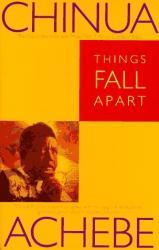
Things Fall Apart by Chinua Achebe is an amazing description of pre-colonial African culture as well as a detailed description of the initial consequences and longer-term impacts of colonization. It follows Okonkwo, a man who was the most powerful member of his village up until the arrival of the colonists. Okonkwo is the manliest of men and believes he must show no weakness. Okonkwo is a representation of the African culture as the colonists arrive. His personal feelings and reactions are very similar to those of all Africans during this strange period. I would recommend this book to anyone who wants to learn more about African culture, but I think everyone should try it because it is an important piece of history, telling the story of a people trying to survive against the colonial onslaught through the story of a man trying to find his way in the world.
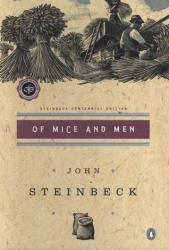
Of Mice and Men by John Steinbeck is a tale of grief and hope in the midst of the great depression. It begins with two men, George and Lennie, who are searching for work on a farm. George is witty and small while Lennie is mentally handicapped but enormous and physically strong. Both George and Lennie, as well as the other workers they meet, begin to represent the nation as a whole during the depression. Showing the struggles of every person in those horrible times. I think the novel is a sad story but it is a good representation of the personal and societal impacts of the depression and I think everybody should read it at least once.
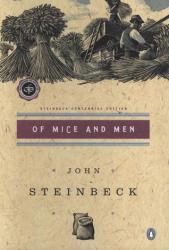
George and Lennie are two laborers searching for work in California. While George is small and quick, Lennie is a man of tremendous size and has the mind of a young child. Despite their differences, they have formed a "family", clinging to their dream of owning an acre of land and producing their own produce. When they find a job at a ranch in the Salinas Valley, fulfilling their dream seems to be within their grasp, but conflict arises when Lennie begins a flirtatious relationship with the ranch owner's wife, and even George can't protect him from that.
I liked this book! Lennie and George's relationship is heartwarming, and it shows that having close friends can make even the hardest life bearable. My favorite characters were Crooks and Lennie. Crooks, who lives by himself because he is the only black man on the ranch, shows how discrimination affects mental well-being. Like Lennie, Crooks has been outcasted and looked down upon by society for something he can't control, and I liked how Steinbeck brought two very different characters together by sharing their shared loneliness. George is a complicated character because, at the end of the book, he does what he believes is 'best for Lennie' but it begs the question of how far a friend should go if it's in 'your best interest'. I watched the movie as well, as it was also really good!
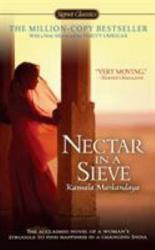
This novel follows the life of a young Indian girl named Rukmani, who is married off at the age of twelve. She marries a poor farmer, Nathan: because she has three older sisters and is not as "desirable" by Indian standards, her parents cannot find a better suiter besides a poor farmer. Throughout their marriage, Rukmani and Nathan struggle with poverty, and misfortune. In addition, British colonizers have set up posts in their town, further destroying Rukmani and her family's sense of community and opportunity.
My favorite character is Rukmani because of her complexity. She is a flawed and interesting character because, on one hand, she breaks the gender norms of her culture and often finds ways to support the family even when Nathan can. However, I will argue that Rukmani is complacent in her poverty and accepts things as the way they are knowing she could do better. I also really liked how this book touched on intergenerational conflicts. Rukmani often finds herself detached from her children because they're growing up in westernized society. Nathan is my least favorite character because he's just...there. Overall, this was a good book because it exposed me to a different culture.
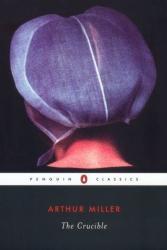
The Crucible is an allusion to the Salem Witch Trails of 1692. The main character, John Proctor, is a well-respected farmer in the small town of Salem, Massachusetts. When the first rumors that there are witches in Salem start stirring, Proctor pays little attention to them: he doesn't particularly believe in witchcraft and believes the townspeople are simply being hysterical. However, when his wife is accused of witchcraft, John has to put aside his personal feelings and find a way to save his wife and friends from hanging.
I hated the ending, but it made the play so much better. John develops significantly as a character. In the beginning, he only cared about protecting his reputation and hiding his affair, but in the final act, John became a martyr for the people of Salem. He's my favorite character in the play, and the movie is just as good!
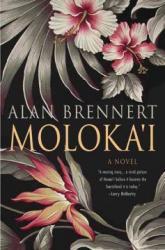
Moloka'i is a book about the undaunted and courageous spirit of humanity. At seven, Rachel Kalama is diagnosed with leprosy, a condition that would alter her life forever. She is taken from her family to spend her life in Kalaupapa, Moloka'i (imagine quarantine lasting for your entire lifetime). On the island, Rachel confronts the aura of death, as the disease progresses among residents without a known cure. Moloka'i is a tale of sadness, but also a tale of survival. In a world of death, there is warmth, love, humor, and hope. The book follows Rachels's life with many twists and turns. I absolutely loved this book and it was one of the best books that I have read this year. Reflecting on the book, it truly demonstrates how there is a lot of good in this world, even if you have to dig deeper to find it.
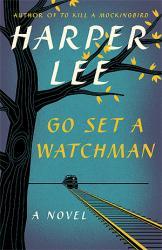
This book was okay. It follows the brilliant "To Kill a Mockingbird". Maybe the shoes were just too big to fill. It's telling that rumor has it Lee didn't want Watchman to be published. The main problem that I had with the book is there is a lot of tedious soliloquizing by Scout. Also, there's a part in the beginning of the book that is straight out of Mockingbird, which isn't surprising as Watchman was written before and became the basis for Mockingbird.
Meh.
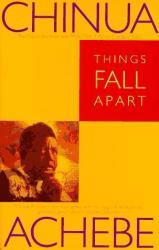
Things Fall Apart is about a Nigerian man, Okonkwo, who watches as his village is destroyed by European missionaries. Once a feared and respected man in his village of Umuofia, Okonkwo is reduced to eventually taking the orders of white men. Okonkwo is a hard and emotionless man who believes that anything that is not masculine is weak and therefore unworthy. When missionaries come to Umuofia, Okonkwo urges his fellow villagers to resist the attempts to diminish their culture and replace their government, but he's met with little support. Eventually, Okonkwo is banned, and when he returns, his village has completely changed.
I liked Things Fall Apart because it's a great book that challenged the idea of African savagery and portrays African culture, specifically Nigerian culture, as complex and intricate, and not the 'uncivilized' society many people view Africans as today. Okonkwo is an interesting character because his unwillingness to adapt to the new change represents an internal struggle many pre-colonized Africans faced in the wake of colonization. The ending is symbolic because it represents the ultimate death of culture as a result of European exploration.
Overall, the novel provides a beautiful insight into another culture often ignored in mainstream media.
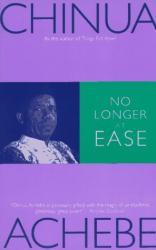
No Longer at Ease is the second installment in the African trilogy series. It is preceded by Things Fall Apart and follows the life of Obi, Okonkwo's grandson. Obi leaves his village in Nigeria to pursue an education in Britain where he meets Clara and falls in love with her. He returns to Nigeria and gets a job in civil service with the help of the board of elders. Obi is conflicted between his African culture and Western lifestyle, and heavy in debt, he takes a bribe.
Just like his grandfather, Obi is strong-minded and stubborn. He intends on marrying Clara although she is an osu, and begins taking bribes when he cannot pay his debts. He questions Nigerian traditions, and often compares Africa to Britain, ultimately positioning him in a place where he finds it nearly impossible to balance both cultures. However stubborn and sometimes reckless Obi is, he's a symbol of generational growth: unlike his grandfather and father, Obi ultimately understood that one culture was not better than the other, and change was imminent. Okonkwo, Nwoye, and Obi symbolize the different industrial stages of Nigeria and the social turmoil that followed, and they show the theme of western versus eastern culture clashes.
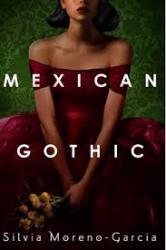
“Mexican Gothic” follows Noemí Taboada’s mission to uncover the dark secrets of the High Place. Her journey begins when she receives a mysterious letter from her cousin with talk of poison and ghosts. Upon arriving, the Doyle household proves to be untrustworthy with the exception of the family’s youngest son. The Doyle family hid prying eyes behind the walls of the High Palace but Noemí’s sleuthing unlocks a wave of violence and madness.
I enjoyed this book and was hooked from the beginning. I recommend this book for people who enjoy reading about mysteries and paranormal activity. There is a hint of romance but the plot does not revolve around that.
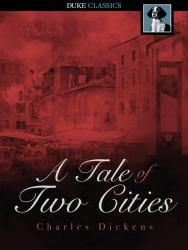
A Tale of Two Cities by Charles Dickens is one of the most popular books of all time, with over 200 million copies sold to date. The novel is set in London and Paris before and during the French Revolution and depicts the plight of the French peasantry demoralized by the French aristocracy, and many unflattering social parallels with life in London during the same period. The main characters are Charles Darnay, a French aristocrat who falls victim to the indiscriminate wrath of the revolution despite his virtuous nature, and Sydney Carton, a British barrister who endeavors to redeem his ill-spent life out of his unrequited love for Darnay's wife, Lucie Manette.
A Tale of Two Cities
One of Charles Dickens's most famous novels, A Tale of Two Cities is also one of his shorter (and better) ones. It begins with an unflattering portrait of an England overrun by highwaymen and courts which are almost as rapacious, and soon shows us a France where things are even worse. Nowhere does Dickens demonstrate his marvelous ability to capture moods and sentiments better than in his depiction of a seething, oppressed populace on the verge of boiling into violence.
And now that the cloud settled on Saint Antoine, which a momentary gleam had driven from his sacred countenance, the darkness of it was heavy—cold, dirt, sickness, ignorance, and want, were the lords in waiting on the saintly presence—nobles of great power all of them; but, most especially the last. Samples of a people that had undergone a terrible grinding and regrinding in the mill, and certainly not in the fabulous mill which ground old people young, shivered at every corner, passed in and out at every doorway, looked from every window, fluttered in every vestige of a garment that the wind shook. The mill which had worked them down, was the mill that grinds young people old; the children had ancient faces and grave voices; and upon them, and upon the grown faces, and ploughed into every furrow of age and coming up afresh, was the sigh, Hunger. It was prevalent everywhere. Hunger was pushed out of the tall houses, in the wretched clothing that hung upon poles and lines; Hunger was patched into them with straw and rag and wood and paper; Hunger was repeated in every fragment of the small modicum of firewood that the man sawed off; Hunger stared down from the smokeless chimneys, and started up from the filthy street that had no offal, among its refuse, of anything to eat. Hunger was the inscription on the baker's shelves, written in every small loaf of his scanty stock of bad bread; at the sausage-shop, in every dead-dog preparation that was offered for sale. Hunger rattled its dry bones among the roasting chestnuts in the turned cylinder; Hunger was shred into atomics in every farthing porringer of husky chips of potato, fried with some reluctant drops of oil.
After spending eighteen years in the Bastille, a French country physician is released and allowed to emigrate to England, where he is reunited with the daughter he has never met. Lucie Manette, typical of Dickens women, is a pure-hearted angel who is instantly devoted to him despite never having known him. Through various plot twists, Lucie marries Charles Darnay, who turns out to be the expatriate nephew of the Marquis who had Doctor Manette imprisoned, in a backstory eventually revealed to us with an even more improbable plot twist.
Once the Revolution begins, Charles Darnay is lured back to Paris to save the life of one of his former servants. Naturally, he is promptly imprisoned and put on trial. His family, including Lucie and their daughter, as well as pretty much the entire cast of the novel thus far, follows him, and are all put in peril of meeting Lady Guillotine. It was the popular theme for jests; it was the best cure for headache, it infallibly prevented the hair from turning grey, it imparted a peculiar delicacy to the complexion, it was the National Razor which shaved close: who kissed La Guillotine, looked through the little window and sneezed into the sack. It was the sign of the regeneration of the human race. It superseded the Cross. Models of it were worn on breasts from which the Cross was discarded, and it was bowed down to and believed in where the Cross was denied.
Dickens's stories are full of improbable plot twists. Characters who met once will always meet again. The coincidences in A Tale of Two Cities almost defy the reader's suspension of disbelief -- but it's Dickens, and Dickens can be forgiven a lot. He shows the pitiless brutality of the French aristocracy and the suffering of the people until your sympathies are entirely with them, and when the tumbrils begin rolling through the streets you can't but think that the aristos had it coming and then some. But then the Terror is unleashed -- and personified in the form of Madame Defarge -- and the oppressed turn just as brutal and pitiless. This is the only way Dickens could have brought our sympathies back to the main characters, who after all, have lived pretty safe and privileged existences even if they weren't the evil "Monseigneur" who ran children beneath the wheels of his carriage. And let's face it, Charles Darnay really picks up the Idiot Ball when he goes back to Paris.
I doubt there are many people who don't know how the novel ends, but while it's a story of redemption and self-sacrifice, I was not nearly as touched by Sydney Carton's heroism as I was by the Madame Defarge vs. Miss Pross
smackdown, which I think is one of Dickens's best climaxes ever, and which none of the film adaptations (below) did justice:
"You might, from your appearance, be the wife of Lucifer," said Miss Pross, in her breathing. "Nevertheless, you shall not get the better of me. I am an Englishwoman."
Madame Defarge looked at her scornfully, but still with something of Miss Pross's own perception that they two were at bay. She saw a tight, hard, wiry woman before her, as Mr. Lorry had seen in the same figure a woman with a strong hand, in the years gone by. She knew full well that Miss Pross was the family's devoted friend; Miss Pross knew full well that Madame Defarge was the family's malevolent enemy.
"On my way yonder," said Madame Defarge, with a slight movement of her hand towards the fatal spot, "where they reserve my chair and my knitting for me, I am come to make my compliments to her in passing. I wish to see her."
"I know that your intentions are evil," said Miss Pross, "and you may depend upon it, I'll hold my own against them."
Each spoke in her own language; neither understood the other's words; both were very watchful, and intent to deduce from look and manner, what the unintelligible words meant.
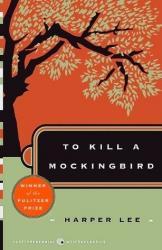
The amount of description in To Kill a Mockingbird by Harper Lee is
amazing. Like, Sherlock Holmes good. The characters are well mapped out, the
interactions felt thought through, and the relationships are believable. I
personally didn’t get all the detail the first read through, just from
enjoying the characters too much. The history is realistic, considering the
time period and how poorly the blacks were treated. All things considered,
this is an engaging read with some actual history.
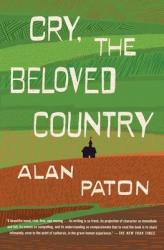
Cry, the beloved country
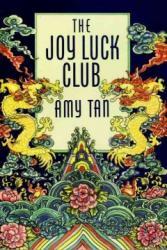
The Joy Luck highlights mother-daughter relationships in the midst of generational conflicts. The Joy Luck daughters, Jing-mei, Waverly, Rose, and Lena, are first generation Chinese-Americans living in San Francisco during the 1980's. They feel their mothers are overbearing and do not understand their desire for independence. Ironically, their mothers feel they are losing their Chinese identity and became Americanized.
I love this book! The book is structured like the traditional Chinese game mahjong, and each of the daughters and mother's stories are complex and thought-provoking. Although it's set back in the 80's, a lot of its themes regarding mother-daughter relationships and intergenerational conflicts are relevant amongst first-generation immigrants and families today. Among the eight main characters, Jing-mei is my favorite, because she's really the only daughter that fully embraces her hyphenated identity.
This book is different because it tells the story of eight women who are so similar yet so different at the same time. I really recommend this to anyone looking for a female dominated novel!
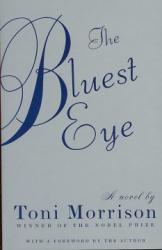
The Bluest Eye is about a young African-American girl named Pecola living in 1940's Ohio. Pecola lives with her brother and abusive parents who constantly tell her she is ugly because of her dark skin and kinky hair. On top of that, the children at her school bully her for the fact that her father is an alcoholic. All her life, Pecola has wanted blue eyes to feel pretty. Her only friends, Freida and Claudia try to defend her against the colorism in their community, but Pecola is unable to embrace her features and becomes obsessive over her desire for blue eyes.
One of the reasons I read this book is because of Morrison's writing style and her thematic elements. The book is very intellectually stimulating and gave me better insight into colorism and how it is still largely prevalent today in the African-American community. I really liked how Morrison used a young girl as a main character to show how these feelings of low-esteem and poor body image are started at a young age, and how the people around us influence our thoughts and feelings.
There are a lot of complex characters and you get to hear each of their stories about why they're the way they are. Claudia is my favorite character because she represents women and girls who challenge our ideas of beauty. The ending was sad, but it really brought light to how damaging our obsession with beauty is.
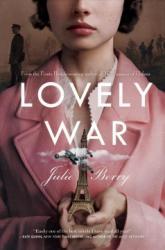
After being caught with her lover, Ares, Aphrodite tells the stories of two couples that fell in love during World War 1. James and Hazel met at a party that Hazel was playing piano for. They start to go on dates and they really like each other, but James is shipped of to the battlefield. Hazel decides to join the Red Cross to be closer to James. There she meets Colette, who becomes a fast friend.
This book was amazing! I loved the perspective of the gods on the story. They often make appearances to discuss specific parts of the story relating to the gods' affinities. I also loved seeing the couples be together, even during their struggles. While reading this book I cried multiple times and couldn't be happier about that.
I would also highly recommend the audiobook. There were so many different narrators it truly felt like I was in the story. One of the characters passions is composing music and in the audiobook you can actually hear the music! It is a wonderful experience.
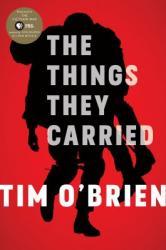
The Things They Carried is a memoir by Tim O'Brien about his experiences as an American soldier fighting in the Vietnam War. O'Brien was chosen to be drafted in 1968. This incident was extremely stressful for O'Brien who had taken a stand against the war, yet didn't want to disappoint his community. He pondered running away to Canada, but eventually decided to fight. The Things They Carried is a series of stories that are so well written. The work is a bit hard to understand just because O'Brien wrote it in a way that is not completely nonfiction. In the book, he explains this concept more in depth. Overall, I thought this book was a very well written, interesting, and educational story regarding the horrors of war from O'Brien's perspective in Vietnam.
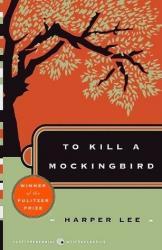
"To Kill a Mockingbird" is an essential piece of literature. It tells a story that highlights the darkness of America's past, through the innocent eyes of a young girl. With this type of narrator, who almost only understands pure truth, joy, and rage, it is possible for readers to feel what she feels, and be brought into her small world (Alabama during the Great Depression) with simple, yet beautiful writing. The story itself is touching, and focuses on themes of family, racism, and solidarity. Aside from its essentiality in explaining America's history, it also can be read as a coming of age story, where the characters begin to see the harsh reality of the world in which they grew up, and in which they created lasting memories and relationships. It will make you laugh, cry, and feel.
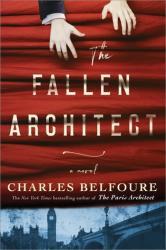
Douglas Layton was a famous architect and a hero until the balcony of London’s Britannia Empire Theater collapsed. The balcony caused many to lose their lives and Douglas Layton served prison time for it. After serving his time in prison Douglas is on a mission to find out who was truly responsible for this tragedy. He gets a job at the same theater and gets a brand new identity to disguise himself. Douglas gathers more evidence that this incident was intentional. He must tread the water carefully and not let anyone figure out who he is. Fallen Architect is a suspenseful mystery book that will grip the reader's interest and will have them craving for more.
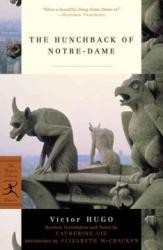
The Hunchback of Notre Dame is about four men who are captivated by a mysterious gypsy dancer. The story begins on a holiday where a play is going on until everyone becomes distracted by the gypsy girl dancing in the square. This is where we meet Esmeralda the gypsy and Gringore the playwright. Many things happen until Esmeralda ends up meeting Pheobus, a soldier, who is very egocentric, when he saves her from the deformed bell ringer - Quasimodo - and a priest named Claude Frollo. Esmeralda is soon accused of witchcraft and is sentenced to be hanged. Fortunately, she is able to find shelter in Notre Dame before that can happen. Many want to kill her, but some want to save her.
I had to read this book for school, and my English teacher recommended it. And the first chapter was not very interesting so I became skeptical, but at the end, I thought the book was really good. There are some parts where the author goes into detail about a location to better help set the scene, and this is where I struggled to focus on the book, but you should push forward because the story line is worth it. The Disney movie did not do this book justice and there is some adult-themed content in the book so I would not recommend this book to middle-schoolers or younger. I do think that sooner or later, everyone should at least give this book a try because it really made me think.
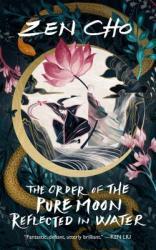
The Order of the Pure Moon Reflected in Water follows a nun who joins a group of bandits trying to protect a religious relic from those who would destroy it. It's a novella, so that's really most of the book, but Zen Cho crams a ton of character development and plenty of plot into this short little read. The two main characters are so well drawn, and I absolutely fell in love with them. The banter between the bandits is loads of fun - I laughed out loud on multiple occasions. There are plenty of fight scenes. I got to learn the word wuxia (think Chinese martial arts heroes). It's very rare that I want a book to be longer, but I so wanted more of this. I'll be checking out Cho's backlist work, Sorcerer to the Crown. 4 stars - that was very good.
Thanks to Tor and Netgalley for the eARC, which I received in exchange for an unbiased review. The Order of the Pure Moon Reflected on Water is available now - put your copy on hold today!